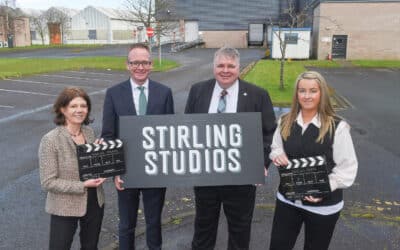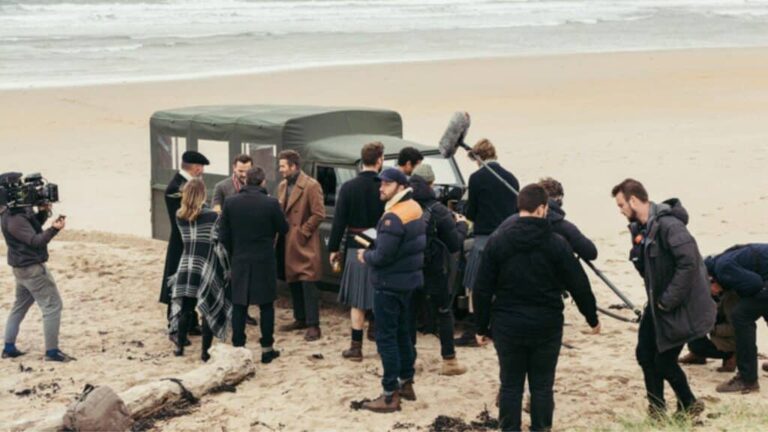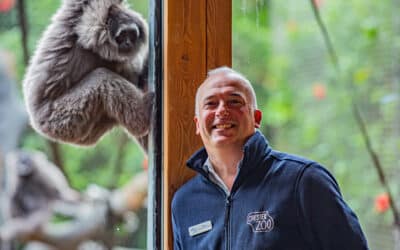Thanks to an ambitious strategy published earlier this year, Screen Scotland has set the stage for Scotland to become a ‘centre of global production’ by 2030.
But with a number of industry issues from squeezed budgets to thousands of freelancers out of work, can Scotland really rise to this starring role in the next six years?
“Scotland is having a bit of a moment right now but there’s no need for us to rest on our laurels,” Mike Ellen, founder of Glasgow-based indie production company Freedom Scripted, tells Prolific North. “We need to just make sure we build something sustainable.”
According to Screen Scotland, its most recent figures for 2021 revealed the screen sector in Scotland contributed an impressive £627.1m to the country’s economy.
Now, the focus is on galvanising plans to further develop Scotland as a centre of global production and a nation with its own ‘vibrant, confident’ film and screen culture, plus an economic growth target of £1bn GVA by 2030/31.
Screen Scotland’s six-year plan includes offering targeted support for productions, backing emerging talent through increased investment in skills and training, fostering a diverse film exhibition sector, and offering support for infrastructure.
And with its rolling lowlands, rugged peaks to historic cobbled streets, Scotland is clearly a much desired filming location used by the likes of Netflix’s One Day to Outlander. But for Screen Scotland to hit its goal by 2030, there’s “still a lot of work to do”.
“You always have to have one foot in London”
Mike Ellen, founder of Freedom Scripted, spent much of his 22-year career split between Scotland and London. With stints working at the BBC, STV and World Productions, he previously held the role as script editor on hit Scottish dramas Taggart and Rebus as well as the BAFTA-winning High Times.
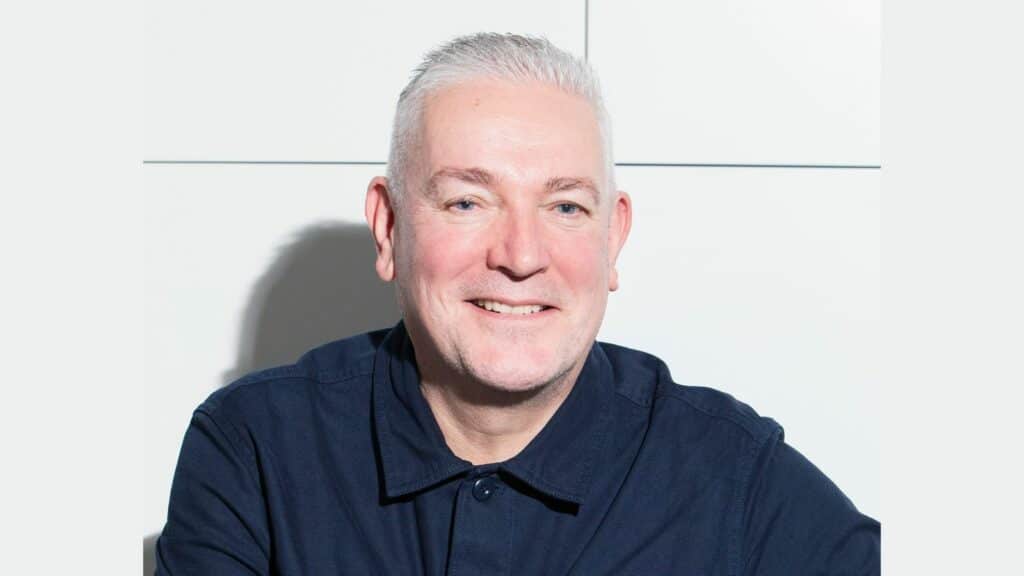
“You always have to have one foot in London, even when you’re based in Manchester or Glasgow, because a lot of the decisions are actually made there,” he explains.
In 2018, he made the decision to move back to his hometown of Glasgow to set up Freedom Scripted thanks to a slice of development money from the BBC, later securing funding from Channel 4’s Indie Growth Fund.
“Having had that small pot of funding, then a slate of projects, talent, and building some commissioner relationships, that’s really all you need to get started. Plus a dose of anxiety!”
The indie also has additional bases across London and Berlin to “avoid being boxed in”. Yet, with so much decision-making still hailing from London, he doesn’t believe this is necessarily a bad thing.
“I think it is changing. In any territory be it the UK, US, South Korea or Germany, there is always going to be a cluster in a particular city where all the money and decision-makers are. That’s not necessarily the end of the world.
“The main drum that I would bang is that at least some of the shows in Scotland or the North of England should be made or led by producers and people who live and work there. If you have that, it becomes less relevant whether that decision is made in London.”
With some London-based companies “chasing around for people with Scottish postcodes”, he believes a lack of local knowledge can “affect the quality of those shows”.
But he’s keen to stress the importance of inward investment: “We absolutely need that inward investment.Outlander is a well made, incredibly successful show. It has made a hugely positive contribution to the industry here and it is a show probably watched more by people in America.
“A mixed economy is good. If you’ve got a big American show shooting next to a show made by the likes of us, I think that’s really healthy.”
But if no profits from those successful hits are retained in Scotland and go elsewhere, once the cameras stop rolling “we’re all just out of work the next day”.
“This is no way a criticism of those companies, they’re just trying to make a show just like everybody else is but how do we build sustainably? If Scotland is having a bit of a moment, we need to make sure we put down some roots, develop IP and some sustainability so that we will, to some extent, have a better control over our own destiny.”
Freedom Scripted has already had many successes this year with the likes of a Channel 4 commission to develop Summerwater, a new six-part drama set against the backdrop of a remote loch-side Scottish holiday cabin park.
“We have a mindset where we want to compete with the very best production companies and indies in London. We don’t look for any special allowances just because we happen to be based in Glasgow and we’d prefer if we were not prejudiced against either.
“We just want a fair crack of the whip, which I think is happening.”
On what Scotland has to offer, he says there are already “brilliant” crews, talent and the likes of Screen Scotland and Business Scotland to help new and existing businesses with advice, support and guidance.
“Let’s make ourselves a brilliant place to come and film. If a Hollywood movie or a high-end TV drama wants to come and use Scotland studios and locations, then that’s brilliant as well.”
“For years, there were no studios in Scotland…”
But to have a thriving production ecosystem worthy of global recognition, there needs to be the right infrastructure in place.
“For years, there were no studios in Scotland. People were always calling for studios to be built but I think the problem is that it was with film studios in mind. There wasn’t the volume to justify it,” explains Ellen.
“What has made the difference is high-end TV – you’re not just making one film, there could be six to ten episodes per season so suddenly, you have the volume and the potential rationale for investment.”
Now, you’ll find the likes of FirstStage Studios in Edinburgh where Prime Video’s The Rig was filmed. Over in Bathgate at the Pyramids Studios, it’s where Danny Boyle brought some scenes from the Trainspotting sequel T2 to life while Glasgow’s Wardpark Film and Television Studios is host to ongoing hits like Outlander.
Following an announcement earlier this year, the creation of the new Stirling Studios is also expected to create “thousands” of jobs in what is set to be “one of the biggest” film campuses in the country.
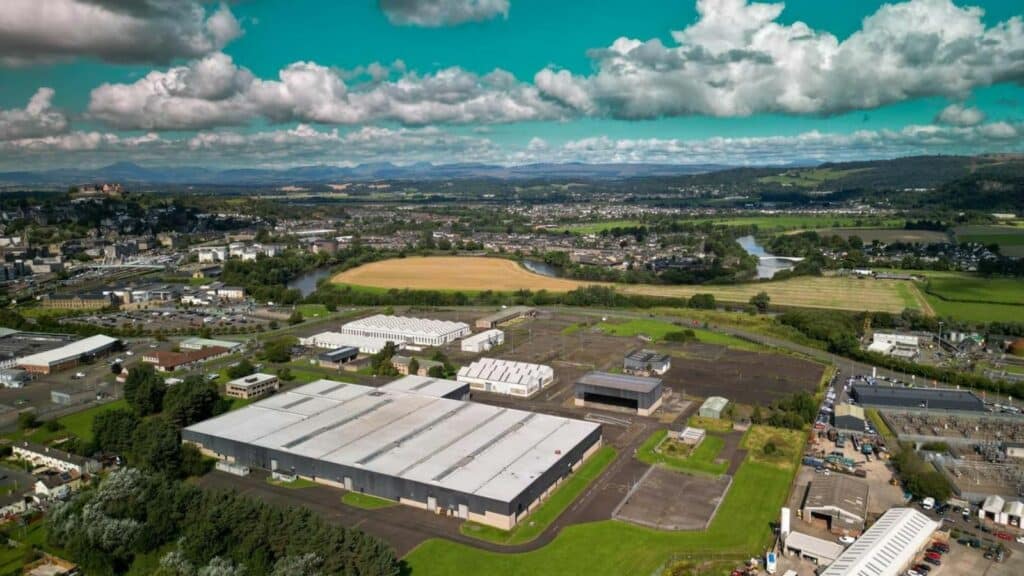
There has been a recent, ‘important step’ in the development of the Stirling Studios project, with the approval of a £6m procurement contract approved to redevelop and refurbish the site.
The majority of the funds will be invested in an existing 160,000 sq ft building, which is expected to become the main hub for Stirling Studios.
“The agreement for the procurement contract to refurbish these buildings will accelerate the transformation of Forthside into a prime economic hub, including the Stirling Studios project,” Stirling Council Leader, Cllr Margaret Brisley, recently said.
“It is an important step in the project’s timeline, with the ultimate aim of turning the site into a dynamic and vibrant location for film and television production, as well as other industries, attracting investment and promoting job creation.
“This is just the beginning of what will be a transformative journey for the Forthside site and the wider area. The establishment of Stirling Studios, in particular, will position us on the global creative stage and provide significant social and economic boosts to the Stirling area for many years to come.”
But despite the apparent boom in studio space, one of Scotland’s biggest film and TV spaces Pioneer Film Studios quietly closed its doors earlier this year due to financial difficulties.
Back in 2023, former Central Scotland MSP Melanie Gallacher said she was ‘disappointed’ by the lack of investment by North Lanarkshire Council and the Scottish government.
For Derek Drennan, co-founder of production management company Nest Productions, one of the “biggest challenges” in Scotland is a lack of education about the studio spaces available.
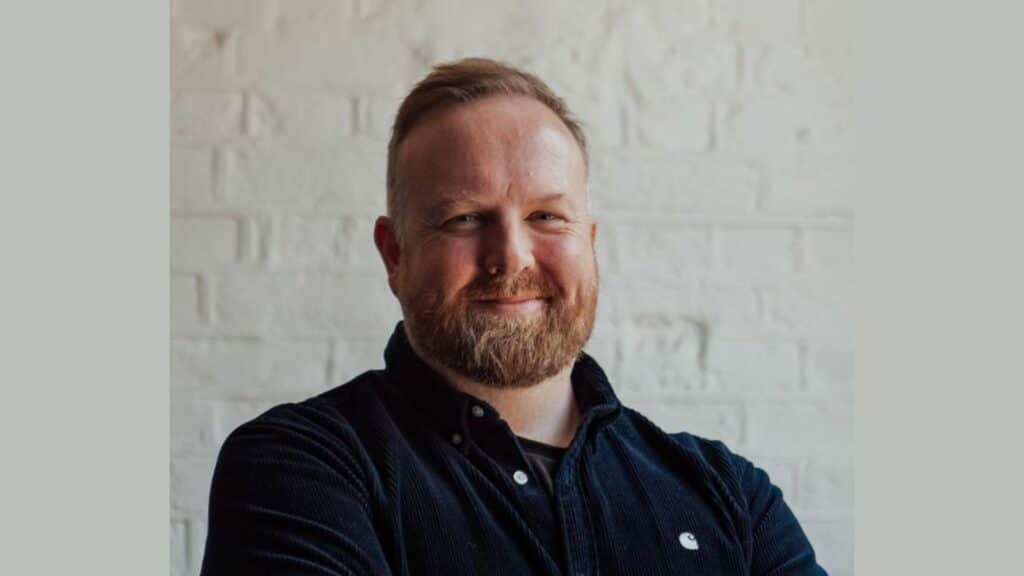
“It’s a big challenge. There are a lot of good studios here that are untapped and not used as much as they could be. I don’t think it’s widely known that there are some really good setups here. There’s BBC Studioworks’ Kelvin Hall, it’s a five minute walk from where I live. Not many people know about it, but it’s a world-leading studio.
“Part of the problem is educating Londoners and the rest of the world. For Scotland to be put on the map, it will just take time.”
For Angus Fletcher, executive producer of film & television at Edinburgh-headquartered LS Productions, Scotland is more renowned for its diverse filming locations.
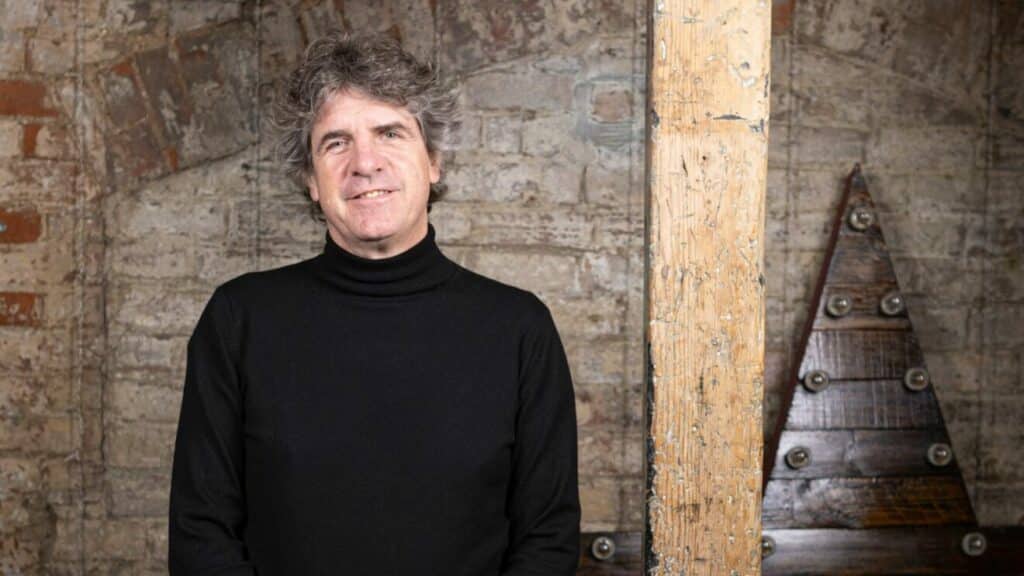
“Scotland is not blessed with a huge plethora of studios, so it tends to be used for location-driven shows,” he explains.
“You’re going there for a ruined castle on the loch, which doesn’t exist in Cheshire. The advantage in Scotland is what Screen Scotland offers, their doors are very open to attracting studios and it’s interesting to see just how many projects are shooting there this year. Many years ago, people would have been surprised by that.”
LS Productions was founded by Marie Owen from her home in Edinburgh in 2006, now with a team of around 50 in-house production and location staff based across its HQ in Edinburgh and additional offices in London, Manchester and a production hub in Malta.
For Screen Scotland’s strategy to be a success by 2030, he says there needs to be more political backing behind the industry and to “broaden the range and genre of projects” in the region.
“If you scratched the surface of most companies, 2023 was not a good year for everyone. One of our strengths in navigating some of those choppier times is with us having depth, having a multi-genre approach, looking at both the short-term and longer term and diversifying wherever it might be.
“We’re not a single genre or indeed a single location operation.”
“It’s very, very rough for people involved in making those shows right now…”
When it comes to talent, Freedom Scripted has been working on training up the next generation of script writers and development staff. But, across the UK, Ellen says there is still a shortage of crews for scripting and drama while factual and non scripted crews are “struggling” to find work.
“There are a glut of factual and non scripted crews who are struggling to get work. It’s very, very tough for people involved in making those shows right now, particularly in the nations and regions.
“Factual producers have been very reliant on traditional broadcasters like Channel 4 and the BBC. They’ve had to cut their budgets and the amount of programmes they commission.
“It’s incredibly competitive to compete for eyeballs. I think the perception is still that scripted content and drama is the best way to do that.”
Crews and production staff “just need the opportunity and training”, he adds.
As a relatively new player in Scotland, Nest Productions recently announced the launch of a new office in Glasgow. It marks the company’s fourth UK hub, in addition to existing offices in Newcastle, Manchester and London.
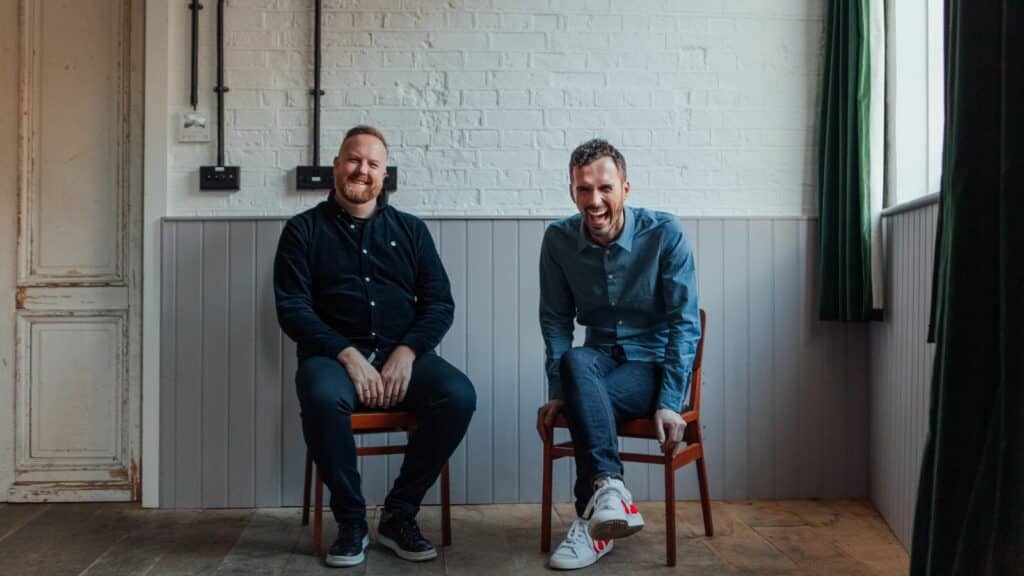
Drennan brings his expertise as the former head of production at Lime Pictures and Wise Owl Films in Leeds, formerly working on unscripted shows including Made in Chelsea, Celebs Go Dating, The World According To Grandpa and TOWIE.
A key reason behind the Glasgow move was “to open up in a place that really needs the support”.
“There are a lot of amazing people here, doing some really great things, but I realised that there are a lot of Glasgow-based production companies that have maybe not delved into the bigger stuff or never really had a look in from the bigger stuff in London.
“A big part of Nest is that we can help bridge that gap because we have the skills, knowledge, experience and network to help bring that to life.”
The big ambition is for Nest to provide production company infrastructure to the smaller productions across Scotland, alongside its commitment to supporting local talent and the wider sector.
“We just make sure that they’re able to do things well. From legal finance, paperwork to insurance, we do all the bits that allow creatives to carry on and concentrate on building a production or company creatively without having to get bogged with the other bits and plug the gap they may not have.
“When we set up as Nest, it was about helping to make sure productions run really smoothly. It’s so much bigger than that now. What small companies need the most, especially in places like Scotland, is a big network to introduce commissioners outside of Scotland and international streamers.”
To secure a commission now, it’s “50% idea and 50% about the team behind it and how it’s all going to work as a production”.
“If you don’t have that, you just won’t have a look in anymore. Channels are commissioning less at the moment but they want to make sure you’ve ticked all those boxes. What we say to small businesses is you don’t necessarily have to do co-production with a big company because we can fill all those gaps for you. It means they retain their IP and their control. We’re just there to steady the ship.”
In contrast to Mike Ellen from Freedom Scripted, he believes Screen Scotland’s 2030 ambitions will “be hard” but it can be achievable “with the right investment, training, and strategic partnerships to make sure companies are equipped”.
“Part of what I want to do at Nest is to bring big juggernauts to the region and offer freelancers work on these projects. It means we’ll be equipped for when even more shows come to the region,” he explains.
“Our strategy was to help the small companies with support but let’s also bring in big productions to Scotland, where we can help train and build up people’s skill sets by putting them on stuff that they might have never had a look in before.”
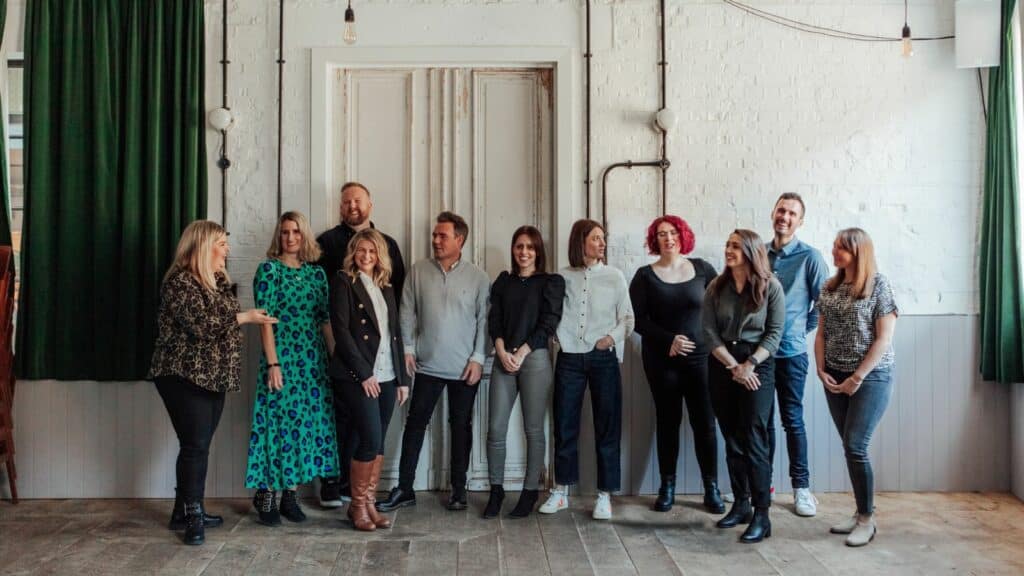
Behind the scenes, plenty of people across the industry have worked on shifting outdated perceptions about Scotland’s potential as a production hub. In a previous role as a freelance production manager, Drennan was part of a team that brought game shows like Eggheads up to Glasgow.
“A lot of people from London said ‘you can’t possibly do that because there are not enough people there.’ It was slightly ridiculous at the time, because we were bringing camera operators from London to work in Glasgow.”
For the first series, they “doubled up the team”, training up camera operators from both London and Glasgow.
“Those shows are so simple and luckily, we did have the money to do that. It shows what we can do if we have investment and the right money into the region.”
But there’s still “a lot of work to do”.
“Before 2030, a lot of investment and partnership building is needed to hit that goal. I think it can be done but it needs the right people, and that is probably one of the reasons why we’re here. We want to really help with that.”
Drennan is also building a coalition of high-profile TV execs to support his petition, calling on the government to extend the existing UK tax credits for high-end TV, animation and children’s TV to unscripted.
“There are currently thousands of people out there that are still unemployed because there isn’t enough money or commissions. If all these freelancers knew that extending this tax credit could help, it would be such a game-changer.”
“It’s a really growing industry here”
Indie production company Tigerlily Productions was co-founded by Nikki Parrott and Natasha Dack almost 25 years ago in London.
Within three years of Nikki Parrott moving her family up to Scotland and opening a Glasgow office, Tigerlily has released its first co-production Poly Styrene with funding from Screen Scotland, plus released other hits like feature documentary Hong Kong Mixtape and BAFTA-nominated doc Is There Anybody Out There?
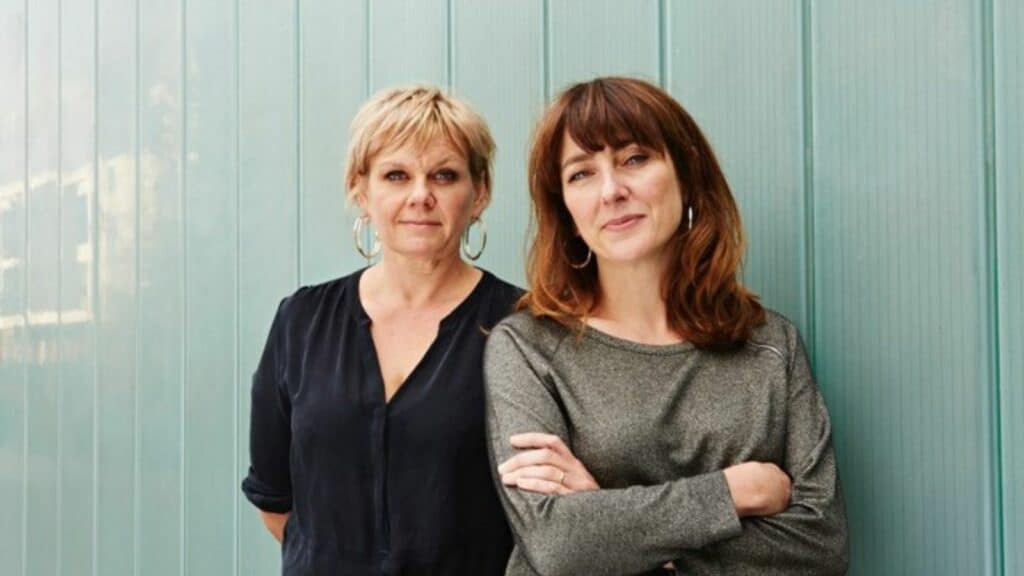
Whether it’s films going undercover at a Premier Inn, going behind the scenes of the Harvey Weinstein scandal or a documentary on iconic musician Pauline Black, Tigerlily creates films “to make a difference” and spark conversations.
On the opportunities in Scotland, she says she has felt “really welcomed” and it’s fair to say Parrott, and everyone we’ve chatted to, agrees on how supportive Screen Scotland has been so far. But support from the government could go further.
“I think we punch above our weight as a company and a country, but it’s really important that we have more business support from the government.
“It’s a really growing industry here. With the tax relief for film and high-end TV companies, plus regional funds, more people will come to Scotland and the UK.”
As two working class female founders who have “made it”, she says Tigerlily is passionate about diversity and encouraging others from working class backgrounds into the sector.
“It’s really hard if you haven’t got a trust fund or a rich parent. That needs to change, especially in Scotland, where it is quite deprived in some areas. There needs to be more regional support and talent schemes to help people get into the industry.”
Although that is now changing, she’s observed that Scottish people are “not so good at blowing their own trumpet” and are still reserved in shouting about the great work emerging from the region.
As one of the board members of Glasgow International Film Festival, she says it is “such a creative place” and there is a 10-year plan in place to make it a “real marketplace” and bring talented people into the industry from the world of theatre. But to move things forward, the likes of BBC Scotland needs to “take a few more risks”.
“In London, everyone is in competition and no one really wants to chat to each other about helping. Here, there’s a real difference and a real network of people who want to do really well, do big things, but they just never really get the look in,” adds Derek Drennan from Nest Productions.
“I think it’s time that we change all that and make it better. Hopefully, that’s the future.”

